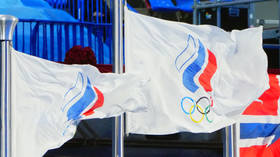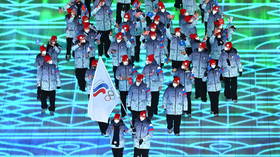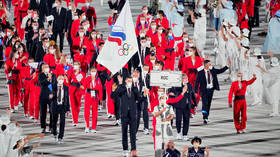Russia responds to US shift on Olympic participation

The Russian Sports Ministry has said it is increasingly apparent that the “politicization” of sport is no longer tolerable. The ministry was responding to comments from American Olympic officials regarding the participation of Russian and Belarusian athletes at global competitions.
The chairwoman of the US Olympic and Paralympic Committee (USOPC), Susanne Lyons, confirmed on Monday that her organization supported a recent declaration from the International Olympic Committee (IOC), which stated it would explore ways for Russian and Belarusian athletes to compete under neutral status at international tournaments.
The development has been seen as a step forward for athletes from the two countries and their chances of being cleared in time to participate at the Paris 2024 Olympic Games.
Russian and Belarusian athletes have been sidelined from a wide variety of sports since an IOC recommendation issued in late February, following the launch of Moscow’s military campaign in Ukraine.
Responding to the shift in the stance of US Olympic officials, Russian Sports Minister Oleg Matytsin suggested that it was indicative of a broader realization that athletes from his country must return.
“Increasingly, reasonable statements are heard in the world sports community about the inadmissibility of the politicization of sports,” Matytsin said in comments shared by TASS on Monday.
“The level of international competitions has fallen due to the absence of Russian and Belarusian athletes.
“I don’t want to make hasty conclusions, the decision remains with the International Olympic Committee.
“The Russian Ministry of Sports hopes that the IOC will listen to the opinion of sports experts and return the Olympic movement to a path outside of politics.
“Our athletes deserve to participate in the Olympic Games – they have been preparing for the most important competitions in their careers all their professional lives.”
The USOPC, Russian and Chinese Olympic Committees were among those to participate at the IOC summit in Lausanne, Switzerland, on Friday.
The subsequent IOC declaration noted a proposal by the Olympic Council of Asia (OCA) to allow Russian and Belarusian athletes to compete at tournaments under its auspices.
The IOC said it had been “unanimously agreed” that the offer should be explored, while the organization also confirmed its commitment to statements from the likes of French President Emmanuel Macron, who has said that sport should not fall victim to political influence.
The IOC has previously argued that the bans on Russian and Belarusian athletes serve to “protect” them from supposed hostility they would face outside their home countries.
That position is now being reviewed, after the Olympic Council of Asia stated that “on the Asian continent, the reasons for the protective measures no longer exist.”
The IOC acknowledged that could also be the case elsewhere, but added the caveat that any potential return for Russian and Belarusian athletes would be without their national symbols and anthems.
Speaking on Monday, US Olympic official Lyons admitted that “prohibiting individual athletes from competing is hard for the [Olympic] movement to tolerate.”
“But there was absolute agreement that this [return for Russian and Belarusian athletes] would have to be strict neutrality,” added Lyons.
“It can’t be the colors, it can’t be the name of the country. A stricter neutrality would have to be maintained.”














